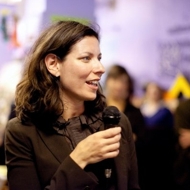Mellon Foundation awards grant to develop new careers for humanities Ph.D.s
What do you do with a doctorate in medieval history if there are no teaching positions or you want to reach a wider audience?

Guyer
With a $1.1 million grant from the Andrew W. Mellon Foundation, the UW–Madison Center for the Humanities will develop career opportunities beyond academia for humanities doctoral students. The grant also will support faculty and students who reach out to the public with their work.
“Universities are rapidly changing,” center director Sara Guyer says, “and it is likely that there will be fewer positions for traditional humanities faculty in the next decades. We must rethink the shape of graduate education in the humanities and the careers for which the humanities Ph.D. is a training ground.”
The grant awarded to the center will fund “Engaging the Humanities,” a new initiative that creates opportunities for graduate students and faculty in the humanities to contribute to civic life. The initiative will focus on:
- creating and designing public humanities graduate fellowships;
- launching the UW’s first-ever graduate certificate in the public humanities; and
- offering a chance for faculty in the humanities to reorient their work so it reaches audiences outside of the university.
“The humanities provide us with the essential context we need to connect vital yet seemingly disparate parts of the human experience,” says Interim Chancellor David Ward. “This grant reaffirms the university’s commitment to supporting the talented scholars who help us understand our world.”
“We must rethink the shape of graduate education in the humanities and the careers for which the humanities Ph.D. is a training ground.”
Sara Guyer
UW-Madison faculty and students in the humanities use their deep historical and cultural knowledge and innovative methods to interpret the past and present and better understand the human experience, Guyer says. Their research has the potential to shape public discourse about major issues ranging from climate change and globalization to creativity and citizenship. Traditionally, these students found professional homes in higher education.
“Thanks to the extraordinary generosity of the Mellon Foundation, we will be able to provide graduate students with experience and access to professional networks that will serve as the building blocks of new careers,” Guyer says.
The public humanities graduate fellowships will integrate non-academic experience and traditional graduate training. The center will collaborate with organizations such as the Madison Public Library, where a graduate fellow could develop legal and practical guidelines and a toolkit for digital self-publishing in literature, music, video.
“This research will not only be valuable to Madison Public Library … but libraries everywhere will be able to benefit from this work,” says library director Greg Mickells.
“This grant reaffirms the university’s commitment to supporting the talented scholars who help us understand our world.”
David Ward
Two fellows will work in the center’s Great World Texts in Wisconsin program, collaborating with humanities faculty and high school teachers from across the state to expand the reach of a curriculum for teaching difficult works of literature in public high schools.
The new graduate certificate in public humanities will include a faculty-taught core course and an annual mini-seminar with distinguished visiting philosophers, historians, curators and literary critics. The certificate will provide a scholarly framework for the public humanities and be open to graduates students across the university. Graduate students will focus on questions of the public, civic responsibility, communication, ideology, and engagement.
The third project, “Public Works,” will support faculty who wish to rethink their research in order to reach a broader public.
The Andrew W. Mellon Foundation has provided strong support for the humanities at UW–Madison, including a $10 million gift in 2010 to enhance education and research in the humanities. The foundation also supports the Mellon Postdoctoral Fellowship Program and, since 1998, has provided generous support for the Center for the Humanities’ Interdisciplinary Workshops for faculty and students.
Tags: careers, faculty, humanities
